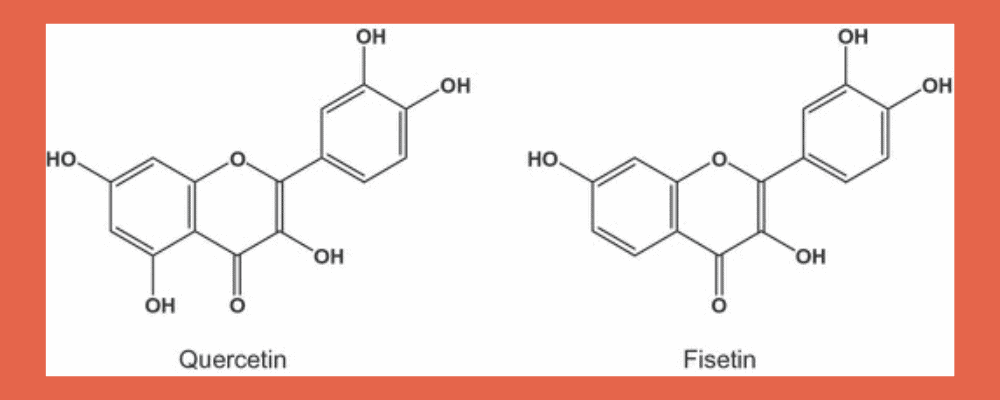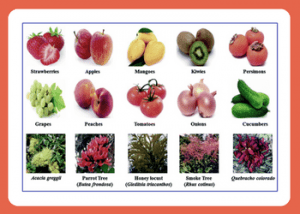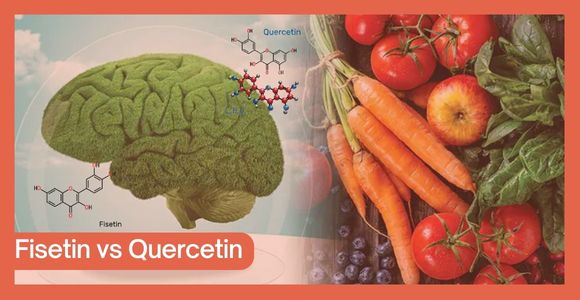Fisetin is a more powerful senolytic than quercetin. Unlike cancer medications that can have potentially harmful side effects, this procedure works independently and is proven to be effective. According to a study published in Aging journal, it successfully removed approximately 70% of senescent cells with no damage inflicted on healthy human cells.
In this article, we will be helping you to compare and contrast Fisetin and Quercetin with regards to their chemical composition, potential health benefits, food sources, bioavailability levels, dosage requirements as well as toxicity levels.
Despite being quite similar in terms of the advantages they bring about for overall well-being; these two flavonoids are still unique in their own ways. By providing a comprehensive overview of both compounds here today- it is our hope that you can gain an understanding between them more effectively.
Table of Contents
What are Fisetin and Quercetin?
Fisetin and Quercetin are flavonoids, organic compounds found in plants that share some of the same potential health benefits. Both contain antioxidant and anti-inflammatory properties which may prove beneficial for certain medical conditions, yet each has its own unique differences including bioavailability, fisetin food sources, and dosage requirements.
- Fisetin is a powerful flavonoid present in many of your favorite fruits and vegetables like strawberries, apples, persimmons, grapes, onions, and cucumbers. This nutrient-dense compound can offer numerous health benefits that make it essential for any diet!
- Its chemical makeup is virtually identical to that of quercetin and kaempferol, two flavonoids found in nature. Fisetin has been scientifically proven to offer a plethora of health advantages, Boasting antioxidant, anti-inflammatory, neuroprotective, and even senolytic capabilities.
- Loaded with numerous health-promoting benefits, Quercetin is a flavonoid found in everyday items like apples, onions, capers, and tea.
- Quercetin shares a similar molecular structure with other flavonoids such as rutin and kaempferol, making it an effective as fisetin supplement.
- Quercetin has been discovered to have a variety of health benefits, such as antioxidant, anti-inflammatory, and even cancer-fighting capabilities.
- Research also indicates that it may have positive effects on cardiovascular health, and can potentially improve allergic reactions and asthma symptoms.
Differences Between Fisetin and Quercetin
| Fisetin | Quercetin |
|---|---|
| An abundance of nutritious fruits and vegetables, including strawberries, apples, persimmons, grapes, onions, and cucumbers are all readily available. | Found in fruits and vegetables such as apples, onions, capers, and black and green teas |
| Its chemical structure closely resembles two well-known compounds, namely quercetin and kaempferol. | Has a chemical structure similar to other flavonoids like rutin and kaempferol |
| With its antioxidant, anti-inflammatory, neuroprotective, and potentially senolytic properties, this remedy offers a wide range of potential health benefits. | Potential health benefits include: antioxidant, anti-inflammatory, and anti-cancer properties, potential benefits for cardiovascular health, and for reducing symptoms of allergies and asthma |
| Fisetin has a lower bioavailability compared to Quercetin, which means that a higher amount of fisetin is needed to achieve the same effects | Quercetin has a higher bioavailability compared to Fisetin, which means that a lower amount of quercetin is needed to achieve the same effects |
Although they share similar chemical compositions, their potential health benefits and bioavailability differ significantly. Recent studies have highlighted fisetin as a naturally-derived substance that could potentially extend lifespan by up to 10%. Through reversing the effects of aging and guarding against age-associated diseases, this miraculous compound offers unbelievable promises for longevity.
Fisetin possesses lower polarity than quercetin, which means that it may have a different rate of absorption and distribution in the body. According to recent studies, Fisetin is far better at destroying senescent cells compared to other substances, as demonstrated by the drastic decline in the red bar of the senescence assay, it is evinced that a remarkable decrease has occurred.
Fisetin can be found in strawberries, apples, persimmons, grapes, onions, and cucumbers while Quercetin is discovered in apples, onions capers as well as black & green teas.
Both possess antioxidant and anti-inflammatory properties, yet Fisetin has also been acknowledged for its neuroprotective features along with senolytic capabilities. Moreover, Quercetin might contribute to improving cardiovascular well-being. Quercetin and Kaempferol are the two most prevalent plant flavonoids that can be found in fruits and vegetables.
Can You Take Quercetin and Fisetin Together?

Absolutely! Taking Quercetin and Fisetin simultaneously is a great way to enjoy even greater potential health benefits as they both belong to the flavonoid family. As their chemical structures are unique, so too are their food sources; however, together these compounds have been proven to support overall health and well-being, promote cardiovascular function, reduce inflammation levels in the body and diminish senescent cells.
It is, nevertheless, essential to remember that it is always suggested to consult a medical specialist before beginning any fresh supplement, including Fisetin and Quercetin in order to ensure safety and determine the suitable dosage.
Fisetin vs Resveratrol
Fisetin and Resveratrol are two flavonoids that have been discovered to possess a variety of wellness advantages. You can find Fisetin in fruits like strawberries, apples, persimmons, grapes, onions, or cucumbers; meanwhile, you will locate Resveratrol in red grapes, berries, and red wine.
Both feature anti-inflammatory effects as well as antioxidant properties – but Fisetin takes one step further with its neuroprotective characteristics plus potential senolytic capabilities while Resveratrol stands out for its possible anti-ageing benefits plus cardiovascular welfare.
Frequently Asked Questions
Can You Take Fisetin Everyday?
Although fisetin is typically safe to take in recommended doses, there is still a lack of conclusive evidence on the long-term safety of taking it over an extended period.
To ensure optimal protection and get accurate dosage advice that takes into account any health issues or existing medications you’re using, consulting with a doctor before starting supplementation is strongly advised. Each case can vary greatly, so speaking with your physician about the correct amounts for yourself will be invaluable information!
 If taken in the correct dosage, Fisetin can be an incredibly beneficial supplement for overall health and wellness. It is believed to reduce senescent cells in the body, along with anti-inflammatory, antioxidant, and neuroprotective effects.
If taken in the correct dosage, Fisetin can be an incredibly beneficial supplement for overall health and wellness. It is believed to reduce senescent cells in the body, along with anti-inflammatory, antioxidant, and neuroprotective effects.
However, it’s vitally important to keep in mind that taking too much of any supplement could potentially have adverse impacts on your well-being.
What is the Best Source of Fisetin?
For a steady supply of Fisetin, eating copious amounts of fruits and vegetables such as strawberries, apples, persimmons, grapes, onions and cucumbers is the best option. However, if you are looking for an alternative source beyond food items then consider taking supplements after consulting with your healthcare professional beforehand.
Fisetin supplements are available in the form of capsules or tablets and contain an extract of the flavonoid fisetin. Fisetin supplements are an ideal source of this essential nutrient for those who have trouble obtaining enough through diet. Although these supplements are generally secure when taken in recommended amounts, it is still advisable to check with a healthcare specialist to ensure the right dosage and safety for your individual needs.
Additionally, further research is essential to gain a comprehensive understanding of the effects that fisetin supplements have on health and how much should be taken.
Can Fisetin Reverse Aging?
Fisetin was the most potent senolytic, it has been found to have the ability to reduce the number of aging-associated and disease-causing cells in our bodies. While research is ongoing, it appears that Fisetin may be able to slow down or even reverse age degeneration. However, there is much more work needed before we can truly understand how powerful this supplement can be when used against premature aging effects.

Is Quercetin Any Good?
Recent studies suggest that quercetin may have powerful anti-cancer, cardiovascular health, and allergy/asthma relieving properties.
Furthermore, research indicates that it could aid athletic performance and help manage the symptoms of certain chronic diseases. However, further investigation is necessary to better understand its effects and potential for benefiting our health.
Fisetin vs Apigenin
With a powerful combination of positive health effects, Fisetin and Apigenin are two incredibly beneficial flavonoids.
Fisetin boasts possible senolytic powers as well as neuroprotective properties while the latter has been noted to possess anti-inflammatory and cancer-fighting abilities. Incorporate these nourishing compounds into your diet by consuming foods such as strawberries, apples, persimmons, grapes, onions cucumbers, or chamomile tea for optimal well-being!
What is the Most Powerful Senolytic?
The term “senolytics” refers to a class of compounds that target and eliminate senescent cells, which are aged or damaged cells that accumulate in various tissues over time. Among the most potent and studied senolytics is the combination of dasatinib and quercetin. Dasatinib, a tyrosine kinase inhibitor used in cancer treatment, and quercetin, a flavonoid found in various plants, work synergistically to induce senescent cell apoptosis through the disruption of pro-survival pathways. This combination has demonstrated remarkable efficacy in preclinical studies, leading to the clearance of senescent cells and improvement in various age-related pathologies in animal models.
The mechanism of action involves dasatinib’s inhibition of the tyrosine kinase activity that sustains senescent cells, coupled with quercetin’s ability to inhibit the anti-apoptotic protein Bcl-xL. This dual impact triggers apoptosis in senescent cells, promoting their efficient removal by the immune system. The specific combination of dasatinib and quercetin offers a promising approach to addressing age-related diseases and extending the health span. Clinical trials and studies are ongoing to further investigate the safety, efficacy, and potential side effects of this senolytic combination in humans.
It’s important to note that while dasatinib and quercetin have shown significant potential, research in the field of senolytics is still evolving, and other compounds with potent senolytic properties may emerge as our understanding deepens. Nonetheless, the dasatinib and quercetin combination currently stands out as one of the most powerful senolytic interventions studied to date.
Fisetin vs Spermidine
Fisetin and spermidine are two distinct natural compounds that have gained attention for their potential health-promoting properties, particularly in the context of aging and age-related diseases. Fisetin is a flavonoid found in various fruits and vegetables, while spermidine is a polyamine compound that naturally occurs in cells.
Both fisetin and spermidine have been studied for their effects on cellular processes and longevity. Fisetin acts as a senolytic agent, targeting senescent cells and promoting their elimination, which has been shown to enhance tissue function and extend lifespan in animal models. On the other hand, spermidine exerts its effects through autophagy, a cellular recycling process that removes damaged components and supports cellular renewal. Spermidine’s induction of autophagy contributes to improved cellular health and has been associated with increased lifespan in model organisms.
Research has shown that fisetin possesses potent antioxidant and anti-inflammatory properties, which contribute to its potential benefits against neurodegenerative diseases and age-related cognitive decline. Spermidine, through its role in autophagy induction, offers cardioprotective effects, helps regulate metabolism, and may mitigate age-related cardiac issues.
Comparing the two, it’s important to note that fisetin primarily focuses on senescent cell clearance and anti-inflammatory effects, whereas spermidine revolves around autophagy induction and cellular renewal. While both compounds hold promise for extending health span and lifespan, their mechanisms of action differ significantly. Ongoing research aims to unravel their full potential and explore possible synergistic effects when used together or in combination with other interventions.
Conclusion
Although both Fisetin and Quercetin have similar health benefits, their uniqueness lies in their key differences. The bioavailability of Fisetin is lower compared to Quercetin, therefore it requires a higher amount to achieve the same results. Therefore, consulting with a healthcare professional when deciding on dosages for your individual needs is paramount for safety reasons and potentially greater health gains if taking them together.
Fisetin is a favorable plant compound that can be effective in combating osteoporosis, an ailment characterized by bone loss. This bone degradation can result in fractures and weakness due to disruptions in the skeletal tissue’s microstructure.
Osteoblasts are the cells that form your bones and osteoclasts break down those same cells. They rely on each other to keep your bones healthy; however, when you have osteoporosis, there is an imbalance of these two types causing a net loss of bone mass.
Research has uncovered fisetin as a possible solution to this issue by stimulating the work of bone-forming cells while suppressing their breakdown in rats specifically.
